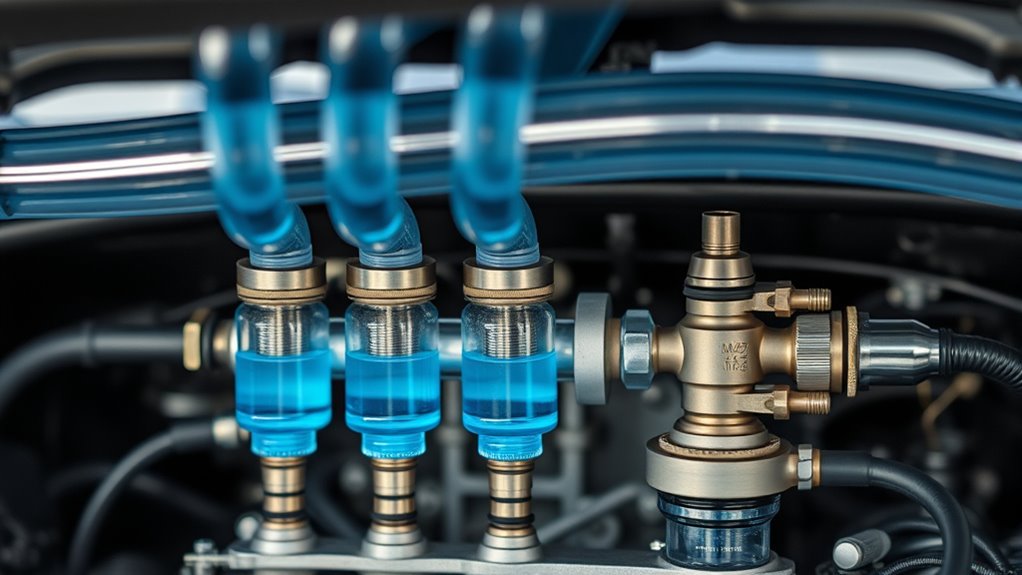Many myths surround methanol injection, but its benefits are clear: it boosts octane, cools the intake, and allows higher boost and compression for better power and efficiency. When set up safely with the right components and tuned correctly, methanol injection can improve performance without damaging your engine. It’s a reliable way to get more from your vehicle. Keep exploring to discover how proper installation maximizes these advantages safely and effectively.
Key Takeaways
- Methanol injection boosts octane, reduces engine temps, and safely increases boost pressure for more power.
- It promotes cleaner combustion and can improve fuel efficiency during spirited driving or racing.
- Proper setup, including correct nozzles and tuning, is essential to prevent engine damage and ensure reliable performance.
- Myths suggest methanol is dangerous or complex, but with proper handling, it is a safe and effective performance enhancer.
- Understanding system components and careful installation maximize benefits while minimizing risks of flooding or knocking.

Have you ever wondered how methanol injection can boost your engine’s performance and efficiency? It’s a technique that’s gaining popularity among car enthusiasts and racers alike, primarily because it offers a straightforward way to enhance power while maintaining or even improving fuel efficiency. When you introduce methanol into your fuel system, you’re effectively increasing the octane level of your fuel, which allows your engine to run more aggressively without knocking. This results in a notable performance boost, especially in high-performance applications. The boost in power comes from the fact that methanol has a high latent heat of vaporization, meaning it absorbs a lot of heat as it evaporates, helping to cool your intake charge and reduce engine temperatures. This cooling effect not only improves performance but also promotes better engine longevity.
One of the main advantages of using methanol injection is that it enables you to run higher boost pressures or more aggressive ignition timing without risking engine damage. Because of this, you can squeeze more horsepower out of your setup without resorting to more complex or costly modifications. Additionally, methanol’s high octane rating means your engine can operate at a higher compression ratio, which directly translates to a performance boost. This makes it particularly appealing for turbocharged or supercharged engines, where optimizing compression and timing is essential for extracting maximum power.
Methanol injection allows higher boost and compression for increased engine power and efficiency.
Beyond performance, methanol injection can improve fuel efficiency, especially during spirited driving or racing conditions. While it might seem counterintuitive that adding extra fuel-like substance could save you fuel, the reality is that methanol’s cooling properties and octane enhancement allow your engine to operate more efficiently. You can often maintain or even improve miles per gallon because your engine runs cleaner and more efficiently at higher power levels without excessive fuel consumption. Moreover, because methanol burns cleaner than gasoline, it can help reduce carbon buildup and other deposits that impair fuel efficiency over time.
However, to reap these benefits safely, you need to set up your methanol injection system properly. Using the right nozzles, pumps, and controllers ensures that you don’t flood your engine or run lean. Proper setup involves tuning your engine’s fuel map to account for the additional methanol, avoiding risks like knocking or detonation. When done correctly, methanol injection offers a reliable way to boost performance and efficiency, pushing your engine’s capabilities further while keeping it safe and durable. Just remember, proper installation and tuning are key to *accessing* these benefits without running into problems down the line. Additionally, understanding the synthetic nature of certain injection components can help prevent potential damage caused by incompatible materials.
Frequently Asked Questions
Can Methanol Injection Be Used on Diesel Engines?
You might wonder if methanol injection can be used on diesel engines. While methanol is primarily a fuel additive for gasoline engines, it’s generally not advised for diesel engines due to compatibility issues. Diesel engines require specific fuel additives designed for their combustion process. Using methanol could cause damage or inefficiency. Always check manufacturer guidelines and consult experts before considering methanol injection for diesel engines to ensure safety and proper performance.
What Are the Long-Term Effects of Methanol Injection?
You might wonder about the long-term effects of methanol injection on your engine. Over time, it can impact your long-term engine health and fuel stability if not managed properly. Methanol may cause corrosion or wear if used excessively, so monitoring and proper setup are crucial. Regular inspections help guarantee your engine remains reliable, and maintaining fuel stability prevents issues that could arise from long-term use.
Is Methanol Injection Legal in All Regions?
Think of legal restrictions like a maze you must navigate carefully. Methanol injection isn’t legal everywhere; regional regulations vary widely. Some areas treat it as a modification requiring special permits, while others ban it outright. Before installing, check your local laws to avoid penalties. Ignoring these legal boundaries can lead to fines or vehicle issues. Always stay informed about regional regulations to keep your modifications compliant and safe.
How Does Methanol Injection Affect Emissions Compliance?
You might wonder how methanol injection impacts emissions compliance. It can reduce certain emissions, helping your vehicle meet strict emission standards, but it also risks regulatory compliance issues if not used properly. Always check your local regulations because improper use could lead to violations. Properly installed and maintained, methanol injection can support emissions standards, but you need to verify it doesn’t cause your vehicle to fall out of regulatory compliance.
What Are the Signs of Improper Methanol Injection Setup?
Your engine’s health is hanging by a thread, so spotting improper methanol injection setup is vital. Look out for signs like inconsistent power, rough idling, or increased emissions—these indicate issues. Check your injection calibration regularly and make certain there are no system leaks. Poor calibration or leaks can cause misfires, damage, and environmental harm—acting like a ticking time bomb for your engine’s longevity. Stay vigilant to keep everything running smoothly.
Conclusion
Now that you know the myths, benefits, and how to set up methanol injection safely, you’re better equipped to make informed decisions. Remember, rushing in without proper knowledge can do more harm than good. Take the time to understand each step and don’t cut corners. With patience and care, you’ll avoid hitting a snag and get the most out of your upgrade. Stick to the plan, and you’ll be sailing smoothly in no time.









